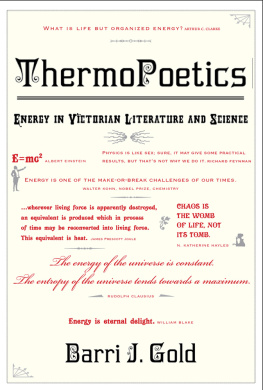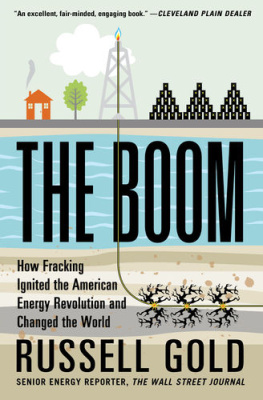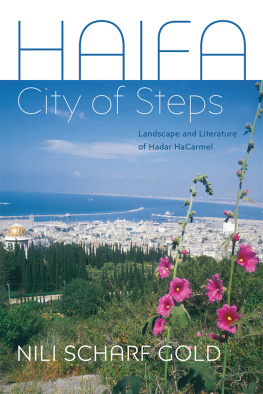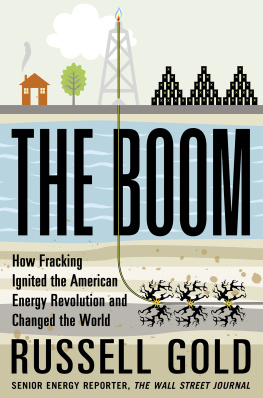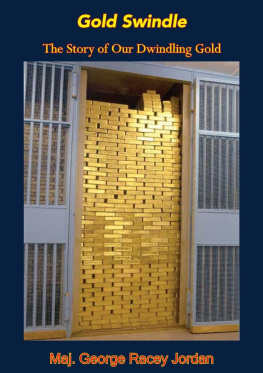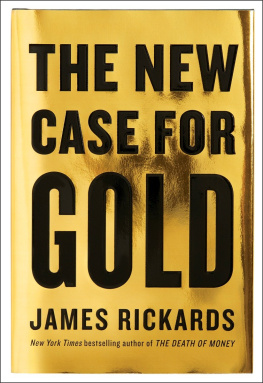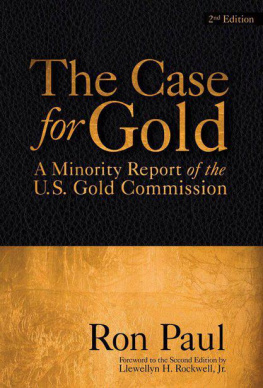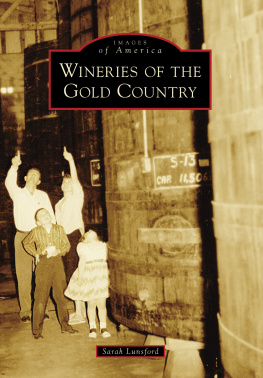Gold - ThermoPoetics
Here you can read online Gold - ThermoPoetics full text of the book (entire story) in english for free. Download pdf and epub, get meaning, cover and reviews about this ebook. year: 2010, publisher: MIT Press, genre: Romance novel. Description of the work, (preface) as well as reviews are available. Best literature library LitArk.com created for fans of good reading and offers a wide selection of genres:
Romance novel
Science fiction
Adventure
Detective
Science
History
Home and family
Prose
Art
Politics
Computer
Non-fiction
Religion
Business
Children
Humor
Choose a favorite category and find really read worthwhile books. Enjoy immersion in the world of imagination, feel the emotions of the characters or learn something new for yourself, make an fascinating discovery.
- Book:ThermoPoetics
- Author:
- Publisher:MIT Press
- Genre:
- Year:2010
- Rating:5 / 5
- Favourites:Add to favourites
- Your mark:
- 100
- 1
- 2
- 3
- 4
- 5
ThermoPoetics: summary, description and annotation
We offer to read an annotation, description, summary or preface (depends on what the author of the book "ThermoPoetics" wrote himself). If you haven't found the necessary information about the book — write in the comments, we will try to find it.
Gold: author's other books
Who wrote ThermoPoetics? Find out the surname, the name of the author of the book and a list of all author's works by series.
ThermoPoetics — read online for free the complete book (whole text) full work
Below is the text of the book, divided by pages. System saving the place of the last page read, allows you to conveniently read the book "ThermoPoetics" online for free, without having to search again every time where you left off. Put a bookmark, and you can go to the page where you finished reading at any time.
Font size:
Interval:
Bookmark:
ThermoPoetics
ThermoPoetics
Energy in Victorian Literature and Science
Barri J. Gold
The MIT Press
Cambridge, Massachusetts
London, England
2010 Massachusetts Institute of Technology
All rights reserved. No part of this book may be reproduced in any form by any electronic or mechanical means (including photocopying, recording, or information storage and retrieval) without permission in writing from the publisher.
MIT Press books may be purchased at special quantity discounts for business or sales promotional use. For information, please e-mail or write to Special Sales Department, The MIT Press, 55 Hayward Street, Cambridge, MA 02142.
This book was set in Stone serif by Toppan Best-set Premedia Limited. Printed and bound in the United States of America.
Library of Congress Cataloging-in-Publication Data
Gold, Barri J., 1966
Thermopoetics : energy in Victorian literature and science / Barri J. Gold.
p. cm.
Includes bibliographical references and index.
ISBN 978-0-262-01372-7 (hardcover : alk. paper)
ISBN 978-0-262-28827-9 (retail e-book)
1. English literature19th centuryHistory and criticism. 2. Physics in literature. 3. Literature and scienceGreat BritainHistory19th century. I. Title.
PR468.S34G65 2010
820'.9'356dc22
2009019766
10 9 8 7 6 5 4 3 2 1
I am grateful to the Modern Language Association for permission to reprint my article, The Consolation of Physics: Tennysons Thermodynamic Solution (PMLA 117, no. 3 [May 2002]:449464), which is revised and included as chapter 1 of this book.
For Andrew and Laney and Kendall
Energy and persistence conquer all things.
Benjamin Franklin
Acknowledgments
Writing a book is hard. Writing a first book while raising two small-but-fabulous children and teaching full time would have been impossible if it werent for the help of others. In addition to Muhlenberg College, which has repeatedly provided financial support, Id like to express special thanks to the many individuals who contributed their energies to this project: To Heidi Reicher and Francesca Coppa for their truly energetic input and unfailing enthusiasm. To Russel Kauffman for our inspiring collaborations and the steadfast interest that always helped keep the ideas flowing. To Jefferson Pooley and Jeremy Teissere for the discussions that kept me on task and up to date. To Steve Lewis and Charlotte Zales for their painstaking attention to the final drafts. To my mom, Estelle Teddy Gold, who not only did so much with the kids, but also proofread the whole. And more love and thanks than I can express to my spouse, Andrew, for his unceasing and expansive support and for never letting me forget that it really does matter.
I The Consolation of Physics: Discovery
Prologue: Physics for Poets
Energy is eternal delight.
William Blake
E = mc2
Albert Einstein
Through a nice piece of luck, I happened to be at the International Centre for Theoretical Physics in Trieste, Italy, in January 2001, where a bumper sticker reading Conserve Energy had been affixed to an office door. In spite of the obviously good intentions behind the message, someone could not resist scrawling on it, The Fools! Dont they know energy conserves itself? This exchange attests not only to the sense of humor enjoyed by physicists the world over, but also to the ambiguity that haunts the conservation of energy. Now where there is ambiguity, the literary among us will not be far behind. Whatever our feelings toward physics, whether or not these are deeply rooted in adolescent trauma, we are personally and professionally okay with words. Suggestive, problematic, sticky, contentious, culturally constructed, laden with baggage, protean, evolving, delicious words. If you happen to be more at home with irony, ambiguity, and metaphor than with force, mass, and acceleration, you will be pleased to know that what we now call physics, especially nineteenth-century physics, can be donewas in fact often conductedin words. Indeed, much of the work of developing energy physics has been the work of wrestling with words. Old words had to be rethought and newly applied. Meanings had to be thrashed out. And occasionally, when nothing else would serve, a new word would be coined, including the word physicist itself.
The rest of this prologue is an introduction to or a review of some of the basic terms and concepts of energy physicsconducted exclusively in words. Read it, skim it, skip iteverything will be redefined as needed anywayor return to it when you feel you need a refresher. In what follows, I turn to the ways a little bit of physics can change how we look at Victorian literature. Meanwhile, I want to share my conviction that physics is a lot more like poetry than one might think.
Energy
Somehow, between William Blake and Albert Einstein, energy took on new meaning. Isaac Newtons disdain for the notion had made energy a faux pas in physics through the early nineteenth century. It was a metaphor, a word to describe people, a pathetic fallacy, a word predominantly for poets. Obviously, something has changed. Certainly, no contemporary physicist is likely to find E = Eternal Delight a particularly useful conversion factor. Very specific meanings, mathematical definitions, nasty-but-useful things like Hamiltonian operators, have emerged to delineate what energy means to the scientific community. And yet, it is a word still on everybodys tongue.
As energy began, in the mid-nineteenth century, to wend its way back into the good graces of science, it did so by building on a well-established reputation of social and metaphorical usage. So much so, that two Victorian writers can begin an account of the new science with the assertion that Energy in the social world is well understood. They proceed, by way of social metaphor, to introduce us to kineticenergy (energy of things in motion) and potentialenergy (energy stored or available for use). That they can do so suggests that by 1868, much of the transition in the meaning and status of energy that would be effected by the Victorians, had been effected. As the word and concept of energy emerge from the consolidation of disparate observables, things that look differentmost notably heat, light, electricity, magnetism, gravitational attraction, and mechanical workcome to be understood as manifestations of the same thing. For a while, some will call it force and refer to the conversion and conservation of forces. Eventually, we will pretty much settle on energy.
The Laws of Thermodynamics
Before diving into its laws, we may as well have a stab at thermodynamics. The term, coined by the physicist William Thomson in 1854 at a meeting of the Royal Society of Edinburgh, one always refers to the two fundamental principles of this science as the laws of thermodynamics. In my opinion, these should be read with the lilting tones of a short Dickinson poem, in which the second clause invests the first with irony, poignancy, and maybe even a bit of self-abnegating humor:
1. The energy of the universe is constant.
2. The entropy of the universe tends towards a maximum.
This simple statement of the laws of thermodynamics was originally made by another physicist, Rudolph Clausius, in 1865 and can be productively read as a good news/bad news joke. The good news is that energy is always conserved. The first law states that though energy may change forms, it can be neither created nor destroyed. For some, this was particularly consoling because it reinforced the notion that such creation or destruction belonged to God alone, that it was and always would be beyond the capacities or hubris of humanity. Isaac Asimov, taking a less godly perspective, explains that the law of conservation of energy tells us we cant get something for nothing, but we refuse to believe it. The upshot is this: while the energy of the universe does remain constant, that by no means ensures our continued access to it.
Next pageFont size:
Interval:
Bookmark:
Similar books «ThermoPoetics»
Look at similar books to ThermoPoetics. We have selected literature similar in name and meaning in the hope of providing readers with more options to find new, interesting, not yet read works.
Discussion, reviews of the book ThermoPoetics and just readers' own opinions. Leave your comments, write what you think about the work, its meaning or the main characters. Specify what exactly you liked and what you didn't like, and why you think so.

